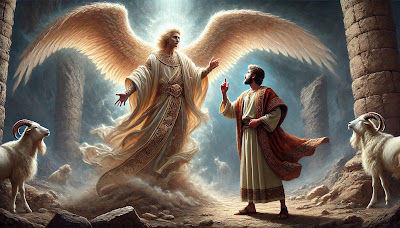Unveiling Daniel 8
The eighth chapter of the Book of Daniel presents a vivid and detailed vision given to the prophet Daniel. This vision, rich in symbolism and prophecy, has captivated and intrigued scholars, theologians, and believers for centuries. Daniel 8 offers a profound look into God’s sovereignty over world events and His unfolding plan for humanity. Let us delve into this chapter, exploring its imagery, interpretations, and the lessons it imparts.
The Vision Described
Daniel's vision occurs during the third year of King Belshazzar's reign. He finds himself in the fortress city of Susa, in the province of Elam, standing by the Ulai Canal. Here, he sees two prominent animals: a ram and a goat.
The Ram with Two Horns
The ram, which Daniel describes, has two horns, with one horn being higher than the other, although the higher one grew later. The ram charges westward, northward, and southward, and no beast could stand before it. This ram represents the Medo-Persian Empire, with the two horns symbolizing the duality of the Medes and the Persians, the latter being the dominant power.
The Goat with a Prominent Horn
Suddenly, a goat with a prominent horn between its eyes comes from the west, crossing the whole earth without touching the ground. The goat charges at the ram with great fury, shattering its two horns, and tramples the ram. This goat symbolizes the Greek Empire, with the prominent horn representing Alexander the Great. The rapid movement of the goat illustrates Alexander’s swift conquests.
However, at the height of its power, the prominent horn is broken, and four notable horns replace it, pointing toward the four winds of heaven. These four horns represent the division of Alexander's empire among his four generals after his death.
The Little Horn
Out of one of the four horns emerges a little horn, which grows exceedingly great toward the south, the east, and the Beautiful Land (Israel). This little horn magnifies itself, even challenging the host of heaven and stopping the daily sacrifices, desecrating the sanctuary. This part of the vision refers to a future king who will rise from one of the successor kingdoms of Alexander’s empire, traditionally interpreted as Antiochus IV Epiphanes, known for his severe persecution of the Jews and desecration of the Temple.
The Angelic Interpretation
In Daniel’s vision, he seeks understanding, and the angel Gabriel is sent to explain the vision. Gabriel confirms that the ram represents the Medo-Persian Empire and the goat represents the Greek Empire. The prominent horn is Alexander the Great, and the four horns are his divided empire. The little horn, which arises from one of these divisions, represents a powerful king who will bring about a time of great distress.
Gabriel reveals that this vision pertains to the time of the end and assures Daniel that the vision is true, though it will be fulfilled in many days to come.
Lessons from Daniel 8
God’s Sovereignty
One of the primary lessons of Daniel 8 is the absolute sovereignty of God over the affairs of nations and empires. Despite the rise and fall of powerful kingdoms, God remains in control, orchestrating events according to His divine plan.
The Reality of Spiritual Warfare
The vision also highlights the spiritual dimension of earthly conflicts. The little horn's challenge to the host of heaven and its desecration of the sanctuary remind us that behind physical events, there are spiritual forces at work. This calls believers to remain vigilant in prayer and steadfast in faith.
The Hope of Deliverance
Though the vision speaks of troubling times, it also points to the ultimate deliverance that God promises His people. The desecration of the sanctuary and the cessation of sacrifices will be avenged, and the sanctuary will be cleansed, signifying God's restoration and justice.
Conclusion
Daniel 8 offers a profound and complex vision that speaks to God's control over history, the reality of spiritual warfare, and the hope of deliverance. It serves as a reminder to remain faithful and vigilant, trusting in God's ultimate plan and sovereignty. As we study this chapter, we gain a deeper understanding of God’s power and His promise to be with His people through all trials and tribulations.
Let us, therefore, draw strength and encouragement from Daniel’s vision, knowing that God is in control and that His purposes will ultimately prevail.






No comments:
Post a Comment